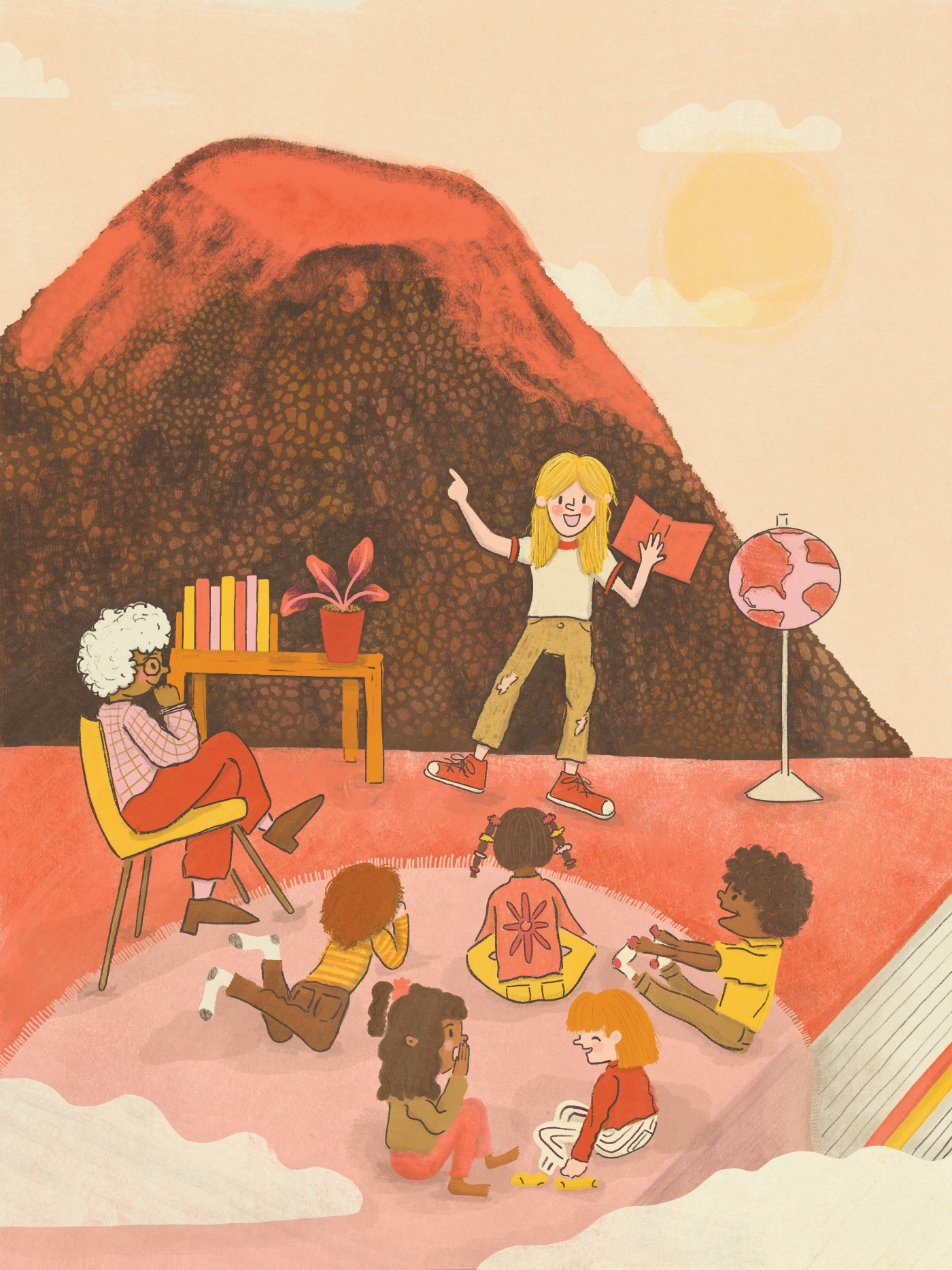Fall 2022
A Reading Room of Her Own
How an early struggle with words—along with two heroic reading specialists—paved the way for a young educator’s teaching philosophy.
- Story by Claire Breiholz

I DON’T THINK that I was fully aware that the Reading Room was remedial because we were always having fun. Mrs. Anderson and Mrs. Botkin were always throwing parties. Sometimes the parties involved words and hats; sometimes they involved “Flying Tootsies” (Tootsie Rolls tossed in the air as a form of celebration).
Outside of the Reading Room, words were painful. They were traps.
It didn’t help that my sister, Camille, three years younger, had outpaced me. The pain of reading seemed only to belong to me. My mom, a teacher herself and dedicated to improving my reading, would have me read to her at night. I crawled through simple books with rhymes like “Bill” and “hill.” When the words didn’t come out right, Camille would sometimes correct my mistakes.
In the Reading Room—which I frequented from ages six to nine—I somehow didn’t care about making mistakes. I even took risks. I don’t know why I picked a book about Pompeii—I think I chose it at random—but I do remember the book changing my life. In my mind I became a newscaster, reading and reporting on the disaster with Mrs. Anderson and Mrs. Botkin as my captive audience. “Once there was a town named Pompeii. Say: pom-PAY,” I exclaimed in my best reporter voice. “Near the town there was a mountain named Vesuvius. Say: veh-SOO-vee-us.” Mrs. Anderson and Mrs. Botkin’s explosions of laughter gave me confidence; my usual red-hot embarrassment was replaced with pride. Turns out Pompeii...Buried Alive! was the book that unlocked my confidence to read.
As I persisted, as I built my confidence, words and stories took me to places I never imagined I’d visit. I read Laura Ingalls Wilder’s The Little House on the Prairie series over and over and over again until the story was part of me. Like me, Laura was a sister, and like me, Laura was determining her place in the world. With every move, Laura’s pioneer family persisted and adapted to new environments, and they always stuck together. As I grew older, the charactersand authors expanded. I’d confer with these fictional and author friends: What would Toni Morrison say? What would Juror 8 think of Ray Hinton’s experience on death row?
Now, as an English teacher myself, I aim to create my own Reading Room, inspired by my reading heroines, Mrs. Anderson and Mrs. Botkin. I have, on occasion, worn a themed outfit to class and celebrated with flying Hi-Chews. The lessons—from persistence to fun to laughter—that grew from the learning environment my teachers created are at the very core of my pedagogy. I am the struggling reader and writer. I know what it feels like to be trapped by words, but I also know what it feels like to be freed by them.
I now understand that stumbling over words is not shameful. When I teach Romeo and Juliet to my ninth graders, we read it aloud as a class, and boy do we stumble. The Elizabethan language tries to stop us—sometimes it succeeds. But we struggle together. There is no shame culture when reading aloud in my class. We all make mistakes—especially me. By the third act, I usually have a waiting list of students lined up to read Romeo, the Nurse, and Tybalt. And by the end of the play, practically everyone has volunteered to read. At the end of the school year, the vast majority report that Romeo and Juliet was their favorite unit.
I love teaching reading because reading unlocks the world—even if the key doesn’t open the door at first. I tell my students to find what they love—pioneers? social justice? aliens? Minecraft?—the subject doesn’t matter. When you read what you love, you will love what you read.
Mount Vesuvius—of all the subjects—led me to my reading life and to my career. A copy of Pompeii...Buried Alive!—a high school graduation gift from Mrs. Anderson—sits in my classroom to remind me where I started.
CLAIRE BREIHOLZ ’20 teaches English classes at Jesuit High School in Portland. She earned a BS in Secondary Education and English from University of Portland.
More Stories
The Making of a President
Robert D. Kelly, UP’s 21st president, comes to the role with faith, experience, and hope for transformation.
- Story by Jessica Murphy Moo